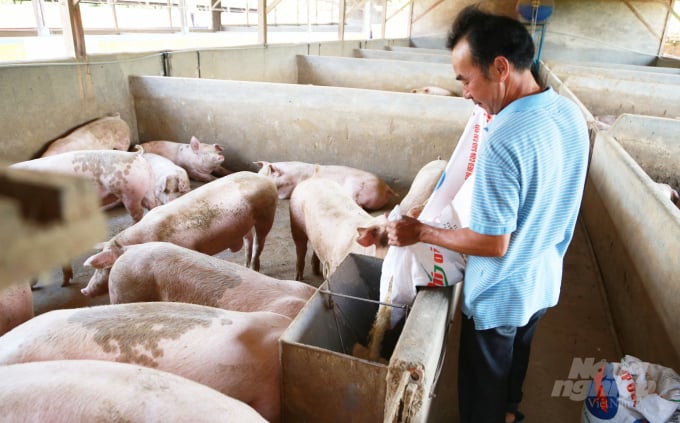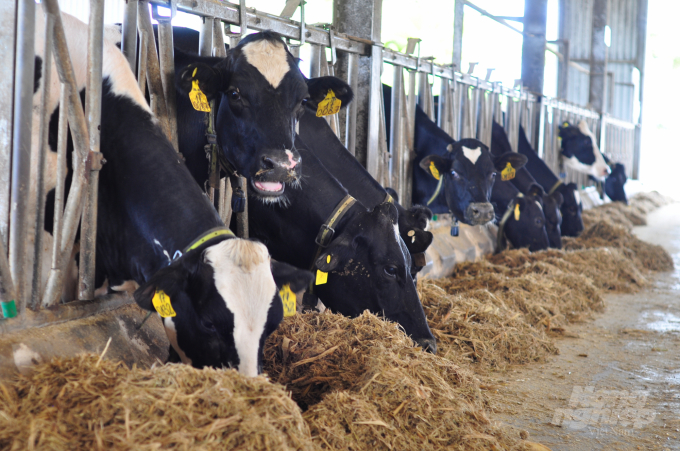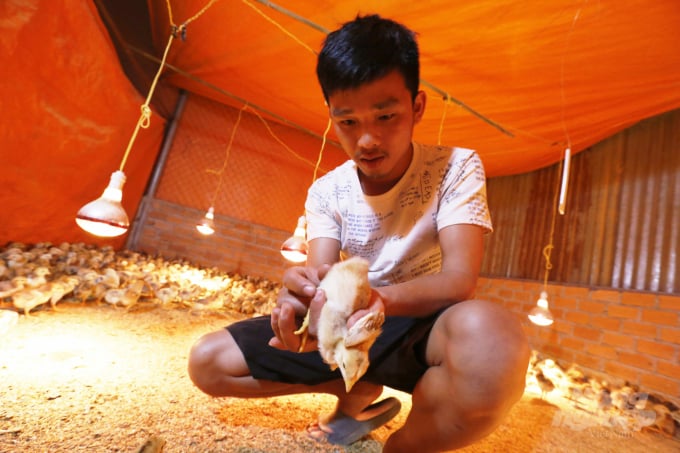May 18, 2025 | 13:44 GMT +7
May 18, 2025 | 13:44 GMT +7
Hotline: 0913.378.918
May 18, 2025 | 13:44 GMT +7
Hotline: 0913.378.918

The agricultural sector of Lam Dong province has strengthened biosecurity measures to improve disease prevention in livestock herds. Photo: Minh Hau.
Over the past time, the agricultural sector of Lam Dong province has deployed good husbandry practices to improve production value and prevent diseases. Accordingly, this locality has encouraged farmers to develop bio-secure livestock production for pigs, poultry, beef, dairy cows and beekeeping farms.
According to Lam Dong Sub-Department of Livestock, Veterinary and Fisheries, up to now, the province has 54 biosafety breeding establishments that have been granted VietGAHP livestock certificates including two biosafety chicken breeding facilities, two pig production facilities, three sturgeon rearing facilities, 47 beekeeping facilities and 2 dairy cow farms.
Pham Phi Long, Director of Lam Dong Sub-Department of Livestock, Veterinary and Fisheries, said that the agricultural sector has been guiding framers to treat livestock waste with biogas. This method is being applied to both farms and household farming models.
Long said the method protected the environment and biogas could be used as fuel for family activities and livestock farms.
The province’s agricultural sector also recommended and guided farmers to use biological products for large-scale livestock farms, especially pig farms. Accordingly, farms will apply probiotics to mix feed or spray directly into the barn, compost pit or wastewater system to reduce odors.

Lam Dong province has 54 biosafety livestock production establishments that have been granted VietGAHP certificates. Photo: M.H.
"The livestock industry in Lam Dong province has determined that the development of bio-secure livestock is an effective measure to prevent diseases. Currently, the agricultural industry is recommending that people develop livestock on biological cushions. For this method, people will use by-products such as shavings, sawdust, rice straw, rice husks as padding and supplement with biological products to treat livestock waste to protect the environment, " Long said.
Long said that breeding technology on bio-mattresses was a new one with positive results in protecting the environment, reducing costs, reducing diseases, and growing livestock faster with better meat quality and higher selling price.
This model was effective and suitable for the scale of raising chickens and pigs, he said.
Moreover, farmers in Lam Dong Province now also focus on waste treatment by composting. With this approach, the generation of odors and toxic gases is minimized. This approach has brought double benefits to farmers when both protecting the environment, protecting the health of farmers and being able to take advantage of livestock waste to make nutrient-rich organic fertilizer for crops.
According to Long, in the past time, African swine fever has occurred throughout the country, causing heavy losses to the livestock industry and Lam Dong province was also affected.
Thanks to the method of raising pigs using probiotics in feed and combined with biosecurity measures, the local African swine fever epidemic was quickly controlled, reducing the damages caused by the disease, he said.

Currently, Lam Dong province jas about 9.7 thousand poultry. Photo: Minh Hau.
At present, the livestock industry in Lam Dong province is implementing a plan to gradually change the old form of livestock to the biosafety breeding process. It also wants to shift medium-and-large-scale farms to commodity production. The province also encourages farmers to develop advanced and high-tech livestock models to improve product quality and value.
The Provincial People's Committee has approved the scheme to develop organic agriculture in the province in the period of 2020 - 2025. Therefore, in addition to the application of safe husbandry measures, the province is developing organic models to reduce the risk of disease occurrence and ensure food safety and hygiene, towards the development of sustainable farming.
"We are focusing on husbandry methods to ensure food hygiene and safety and protect the environment. At the same time, we develop livestock towards VietGAP, GlobalGAP, and Organic standards to achieve the requirements of quality, food safety and hygiene, ensuring social welfare and the health of producers and consumers, contributing to environmental protection and product traceability", Long said.
Along with the implementation of biosafety breeding methods, the agricultural sector of Lam Dong province also focuses on building handling when there is an epidemic.
Accordingly, the agricultural sector calls on farmers, when detecting the death of cattle and poultry, must immediately notify the local authorities and veterinary officers for timely handling.
Do not sell sick cattle and poultry. Do not throw dead cattle and poultry into the ponds and lakes around the farms. Do not eat sick cattle and poultry.
The agricultural sector also prohibits the transportation, trade, and slaughter of livestock, poultry and livestock and poultry products when there is an epidemic. At the same time, a quarantine station is established to prevent people and vehicles from entering and leaving the epidemic area.
According to the Sub-Department of Livestock Production, Veterinary Medicine and Fisheries of Lam Dong province, the locality has about 540,000 cattle and poultry including about 13,000 buffaloes, nearly 100,000 cows with 25,000 dairy cows and 75,000 beef cows, about 416,000 pigs, 13,000 goats and about 9.7 million poultry.
Translated by Hien Anh

(VAN) Minister of Agriculture and Environment Do Duc Duy held a meeting with Soopakij Chearavanont, Chairman of C.P. Group, on May 15.
/2025/05/16/3800-0-nongnghiep-143756.jpg)
(VAN) Suntory PepsiCo Vietnam coordinated with the Ministry of Education and Training to implement an education program on water conservation, reaching nearly 1 million primary school students nationwide.

(VAN) Vietnam’s TH Group officially put its high-tech fresh milk processing plant into operation in the Russian Federation, marking a historic moment as the first TH true MILK cartons were produced in Russia.

(VAN) Use of high-quality broodstock and biotechnology is regarded as the most effective approach to ensuring sustainable and economically viable shrimp aquaculture ahead of climate change and the emergence of increasingly intricate disease patterns.

(VAN) Carbon farming is a form of agricultural practices that helps absorb more greenhouse gases than it emits, through smart management of soil, crops, and livestock.

(VAN) This is a key content of the Memorandum of Understanding recently signed between the Vietnam Fisheries Society and Kunihiro Inc of Japan.

(VAN) To achieve the goal, local authorities and businesses in Kon Tum province have fully prepared the necessary conditions for the new Ngoc Linh ginseng planting season.